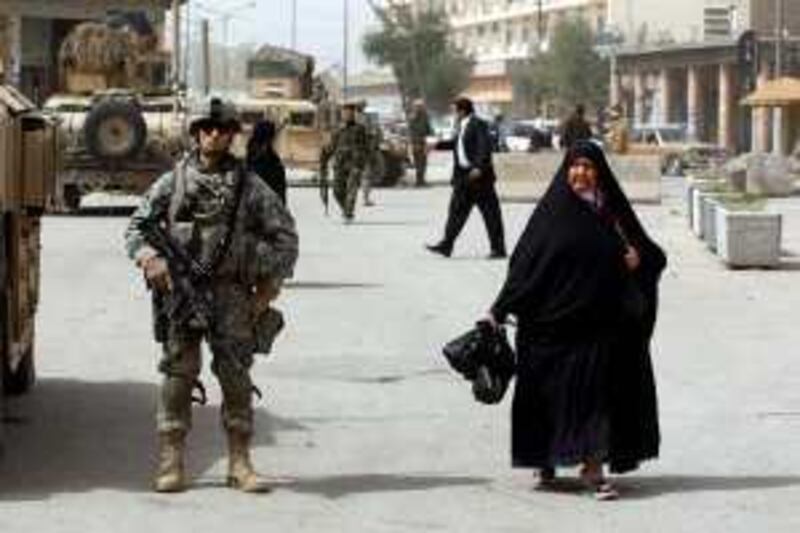Baghdad // For six long and sometimes terrifying years it had seemed the US army would forever be fighting on Iraq's soil. But with a pullout date now set and the latest announcement that 12,000 troops will be withdrawn by September, Iraqis are beginning to face the reality of a future free of occupation. Some harbour concerns about what will happen when the final US soldiers have left. Many others doubt that day will ever actually come; they are certain the military will want to find a way to stay past the deadlines.
Most Iraqis were suspicious of US motives for invading in 2003 and it is hard to find anyone who thinks the war has had much to do with democracy or freedom. Desire for oil, money, power or revenge are considered the real inspiration. Yet while a majority have wanted to see an end to the occupation almost from the moment it began, there remain real concerns about the withdrawal; that the government may not be strong enough to survive without US support, for example, or that religious militants will resume their currently stalled campaigns of violence. These worries are not being helped by a brewing economic crisis.
"Iraq is in a dangerous situation," said Abdul Wahid Rahman, a political analyst from Tikrit, Saddam Hussein's hometown. "Iraq is too dependent on oil and with the fall in oil prices, it means that in economic terms the situation is dire. That is likely to have a real effect on security. "If the economy were to collapse any further, the security we have could collapse as well. This is all very fragile. It may get bad enough that the Americans decide they cannot withdraw. I think that's a real possibility. There could be a real collapse, a return to chaos."
This month, faced with falling oil revenues, Iraq's parliament agreed to a reduced budget and cut US$4.2 billion (Dh15bn) from the original spending plan. With the national economy dependent on public funds, any further drops in oil prices could leave the government facing huge deficits and forced to make further savings. The potential for severe economic problems, in a country where vast numbers of people live in poverty and rely on rationed food handouts, have prompted warnings from parliamentarians.
"We are lucky for now," Mahmoud Othman, an independent MP from Kurdistan was quoted as saying by the International Herald Tribune newspaper. "But we could face disaster in six months. I think the problem is coming." In a sign of how serious the situation is, MPs took a 10 per cent salary cut, bringing their monthly income for official duties down to $7,600. They still get $12,800 per month to pay for bodyguards.
"Most government workers and public sector employees are already on low salaries and there may come the time when salaries are cut," Mr Rahman said in an interview. "If that happens you will see a rise in security problems." Even if a doomsday economic scenario does not materialise, Mr Rahman predicted possible problems with a US withdrawal as Washington argues with Iran over Tehran's nuclear programme.
If that dispute were to come to a head, Iran could work to undermine Iraq and ensure that US troops get bogged down again or have to leave an unstable country under fire, something that would humiliate the US military. "Iran has unquestionably interfered with Iraq's internal affairs in the past," Mr Rahman said. "And Iran continues to have great ambitions here and in the Gulf region." The Kurds have made no secret of their concerns about a US withdrawal, viewing the army as a guarantor of their autonomy against the centralising tendencies of Baghdad.
The Kurds are concerned that, without US soldiers, an Arab-dominated government will use military force over such contentious issues as Kirkuk, the oil-rich city the Kurds claim as theirs but which Baghdad insists should not be part of the autonomous Kurdish region. Sami Shoresh, a former culture minister in the Kurdistan Regional Government, warned a civil war could ignite. "A US troop withdrawal could lead to the emergence of fighting between the central government and the Kurds in those areas disputed between the Kurds and the Arabs," he said in a recent interview with al Sharqiya television.
In the Shiite-dominated south of Iraq the situation is largely quiet after a successful government campaign against militias. There the US pullout prompts far fewer concerns, although the economic storm clouds mean some fear collapse of security. And there is the ever-pressing matter of Iran, with many Iraqi nationalists fearing the spread of Iranian influence. Speaking in Baghdad, Izz al Din Dawla, an MP with the Tawafuq Front, said the United States would face contradictory problems.
"I don't think Barack Obama will be able to pull out the soldiers as quickly as he says," Mr Dawla said. "It will take longer. On the other hand the economic crisis makes it harder for the Americans to afford to have troops here." Ultimately, Mr Dawla said, the US military will have to leave and the Iraqis will have to learn to stand alone. "A lot of this will depend on the power and performance of the Iraqi government," he said. "There will not be any problems if the people believe the government is stronger than any of the militias. Then they will stand with it and the country will be stronger than with the Americans here."
nlatif@thenational.ae





